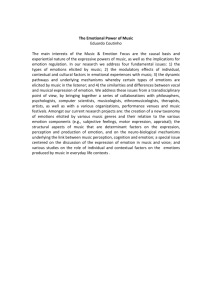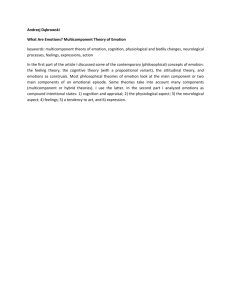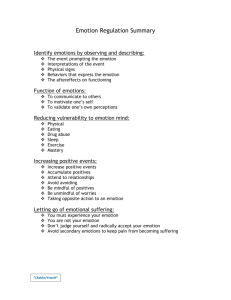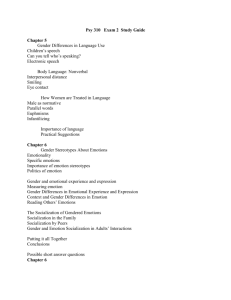WHAT IS AN EMOTION - London School of Philosophy
advertisement
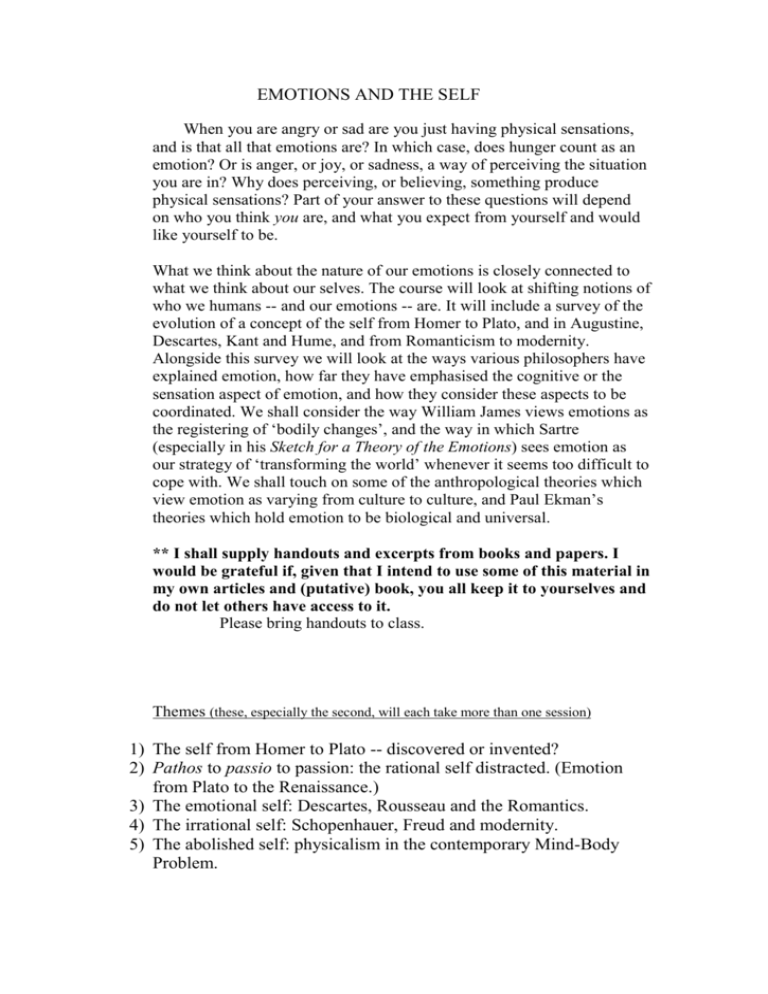
EMOTIONS AND THE SELF When you are angry or sad are you just having physical sensations, and is that all that emotions are? In which case, does hunger count as an emotion? Or is anger, or joy, or sadness, a way of perceiving the situation you are in? Why does perceiving, or believing, something produce physical sensations? Part of your answer to these questions will depend on who you think you are, and what you expect from yourself and would like yourself to be. What we think about the nature of our emotions is closely connected to what we think about our selves. The course will look at shifting notions of who we humans -- and our emotions -- are. It will include a survey of the evolution of a concept of the self from Homer to Plato, and in Augustine, Descartes, Kant and Hume, and from Romanticism to modernity. Alongside this survey we will look at the ways various philosophers have explained emotion, how far they have emphasised the cognitive or the sensation aspect of emotion, and how they consider these aspects to be coordinated. We shall consider the way William James views emotions as the registering of ‘bodily changes’, and the way in which Sartre (especially in his Sketch for a Theory of the Emotions) sees emotion as our strategy of ‘transforming the world’ whenever it seems too difficult to cope with. We shall touch on some of the anthropological theories which view emotion as varying from culture to culture, and Paul Ekman’s theories which hold emotion to be biological and universal. ** I shall supply handouts and excerpts from books and papers. I would be grateful if, given that I intend to use some of this material in my own articles and (putative) book, you all keep it to yourselves and do not let others have access to it. Please bring handouts to class. Themes (these, especially the second, will each take more than one session) 1) The self from Homer to Plato -- discovered or invented? 2) Pathos to passio to passion: the rational self distracted. (Emotion from Plato to the Renaissance.) 3) The emotional self: Descartes, Rousseau and the Romantics. 4) The irrational self: Schopenhauer, Freud and modernity. 5) The abolished self: physicalism in the contemporary Mind-Body Problem. General book list (I advise buying the What is an Emotion? by R. Solomon – the other books are ones I refer to, and that you may want to get out of a library) *What is an Emotion?: Classic and Contemporary Readings, edited Robert Solomon (Oxford University Press, 2nd edition – make sure it is the second, not first) The Navigation of Feeling William Reddy (Cambridge University Press) The History of Emotions: An Introduction Jan Plamper (Oxford University Press) The Idea of the Self: Thought and Experience in Western Europe since the seventeenth century Jerrold Siegel (Cambridge University Press) Self and Subjectivity ed, with commentary, Kim Atkins (Blackwell) A Brief History of the Soul Stewart Goetz and Charles Taliaferro (WileyBlackwell) Self: Ancient and Modern Insights about Individuality, Life and Death Richard Sorabji (Oxford University Press / Chicago University Press) The Nature of Mind ed David Rosenthal (Oxford University Press) The Discovery of the Mind in Greek Philosophy and Literature Bruno Snell (Dover) Greek Models of Mind and Self A A Long (Oxford University Press) Emotion William Lyons (Cambridge University Press) The Emotions: Social, Cultural and Biological Dimensions ed Rom Harré and W G.Parrott Culture Theory: Essays on Mind, Self and Emotion ed R A Schweder and R A Levine (Cambridge University Press) Emotion and Peace of Mind: from Stoic agitation to Christian Temptation Richard Sorabji (Oxford University Press) From Passion to Emotion Thomas Dixon (Cambridge University Press) The Passions of the Soul René Descartes (various editions or in collections of his works) Expression of the Emotions in Man and Animal Charles Darwin Sketch for a Theory of the Emotions JP Sartre (Routledge)



